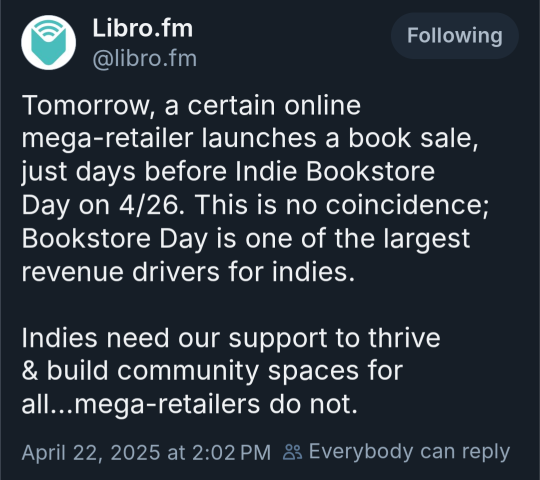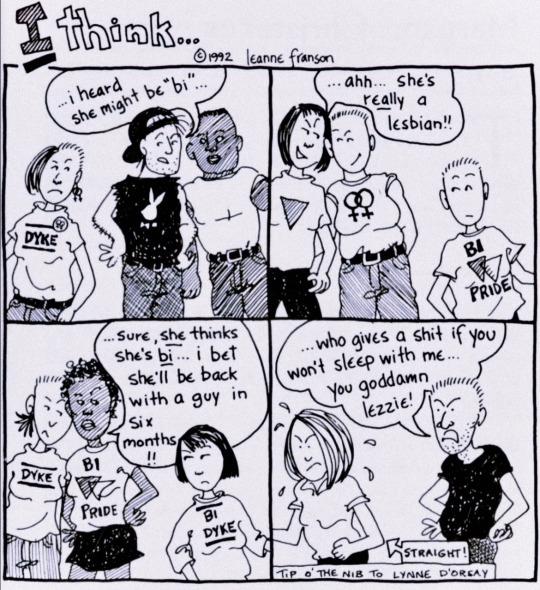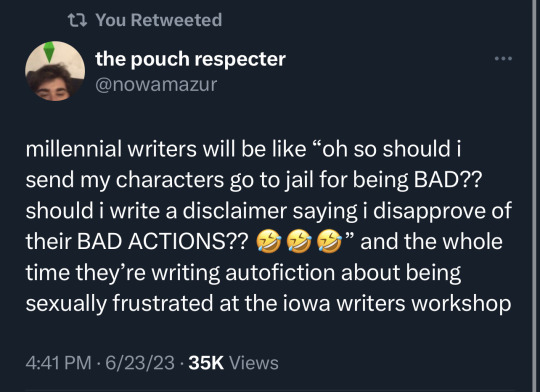Editor / Writer / ReaderFind me on LinkedIn, Instagram, or my website!
Don't wanna be here? Send us removal request.
Text
That prophetic poster is also 100% correct about Rowling not reading any other fantasy. She says as much in this article from August of 2005, only a few months after they left that comment.
I'm sorry, I don't believe that anyone who has read regularly since childhood would still count Harry Potter as the best book they've ever read.
#i also made a post about that article a lil while ago!#bc it really shows how little jkr actually knows about her own genre#the same with lev grossman#although i haven't read the magicians so i feel like i have slightly less of a right to critique#anti jkr#anti harry potter
9K notes
·
View notes
Text

This is pretty wild because I thought Stephen Fry was a Rowling defender for a good while.
Also go follow @tgraywrites if you aren’t already.
2K notes
·
View notes
Text
How do I know I'm ready for a writing workshop?
Hello new writer! Considering a workshop to get feedback on your latest project? That's a fantastic idea! Workshops are an amazing experience and great way to work through ideas faster while gaining personalized insights on what you can do to improve your work.
But, as I'm sure you know, the workshop is not a glamorous space. It's a bunch of creatives, all at different levels of experience and from different genres, sitting in a room together, debating what makes a work 'good' or 'better'.
It's tough! You never know what other people's intentions are or what they think is appropriate in a workshop space. If you've never been critiqued before, the experience can be jarring, unpleasant, and overwhelming. So before you sit down at the coffee shop or click into that mysterious Discord call, make sure to ask yourself some essential questions I've listed below.
What do I want from this workshop?
Before attending, it's incredibly helpful to understand what you are hoping to gain from the experience. Consider what you are struggling with most in your current project. Are you facing writers' block? Is there a scene that just isn't working? Or a character you just can't make sense of?
When you have an answer to this question, make sure to communicate that to your fellow workshop attendees. If it's a decent workshop, they'll take your question and use it to inform the feedback they provide you with. Hopefully you walk away with an answer to your question and ladder to scale that block with!
These types of questions can also help direct feedback if your fellow workshop attendees are less familiar with your genre or style. By giving them one or two things to focus on (character voice, narration, dialogue, etc.), you can help direct their attention to the parts of the piece you want to address. Without doing this, some workshop attendees might get distracted by their own personal writing hang ups or resort to giving generic advice.
What are the limitations of my genre or style?
To start, if you can't clearly describe what genre you're writing in, I would seriously consider that before attending a workshop. Being able to describe your piece concisely and effectively to a group of other writers makes a huge difference when they're providing feedback.
It's really common for workshop attendees to be older, retired individuals, so they are coming to the space with a lifetime of different reading experiences. You may think your piece is clearly science fiction, but the 2,500 words they get from your work may not clearly communicate that to them if they have preconceived notions about what science fiction must look like.
I, for example, once brought a piece in asking about the character voice in a fantasy piece, and another writer told me that my language wasn't 'fantasy' enough for a piece with an elf protagonist. This man was older, so it was easy enough to assume he was thinking of The Lord of the Rings when he spoke. But my project was always going to be closer to Legends and Lattes then to anything Tolkien, so I just had to smile, nod, and take the feedback politely while knowing I wasn't going to use it at all.
Speaking of -
Can I handle critique? How do I know if I can't?
This might be the most important question to ask yourself before you step into a workshop, but it is really hard question to answer if you've never shown anyone else your writing before.
First and foremost, most workshops do not require you to bring writing in. You are more than welcome to show up and provide feedback while bringing nothing of your own. If this is your first time trying a workshop, do that! This is a great way to gain an understanding of what kind of feedback other writers provide, and to start building your definition of 'good' and 'bad' feedback based on the critiques you give others.
The more you practice giving feedback, the more clear it will become when others are not providing kind, constructive responses to your work. It's important to remember that critiquing is a skill like any other, and its one that aids your writing ability as well as your fellow writers'. Once you know how to critique others, you'll get better and better at reading your own work for revision.
Once you've got answers for all three of these questions, go forth and explore! There are so many fantastic spaces where writers gather, try out a few before you decide where to settle. And if someone in the group is particularly helpful, reach out! Exchange longer work with a friend. Ask questions. Build community.
#writing advice#cvoyaging#writers on tumblr#writers and poets#writing workshop#author#indie author#writing
3 notes
·
View notes
Text

Yet again, more proof that capitalism was never about "freedom" or "small government".
#capitalism#ai model#artificial intelligence#the conversations that could've been had in my mass comm law if only it'd been a year later honestly
71K notes
·
View notes
Text
So I have recently been reading Hungerstone, a Carmilla retelling set in England during the Industrial Revolution era. And it's not bad, per se, but it's also not particularly inventive or got anything to say beyond slightly dramatic, Tumblr-esque quotes about female rage and womanhood is horror etc etc.
This, in turn, got me thinking about What Moves The Dead by T. Kingfisher, which was perfectly adequate as a retelling of The Fall of The House of Usher, but didn't necessarily reinvent the story in any interesting way (or maybe I'm just biased, because I love mycological horror–but this book had such a boring take on it).
And I have to ask, which one do you guys think is worse: a retelling that totally distorts the point of the original text (for example, the recent surge of P&P retellings which reduce Elizabeth and Darcy to grumpy asshole billionaire x sunshine feminist girl next door), or a retelling which understands and appreciates the spirit of its parent text but really does nothing special with its own narrative as a reinterpretation?
Note: this pertains to book retellings only, and not to TV and cinema. Also note, adaptation from one format to another =/ retelling.
RB FOR SAMPLE SIZE
104 notes
·
View notes
Text
Literature recommendations for the coming days (Pt 105)










93 notes
·
View notes
Text
Metamorphosis Behind The Closet Door (18+)
Making a monster takes blood, sex, and queers! If you're interested in horror and queer theory, and you're attending Phoenix Fan Fusion this year, join me on Sunday, June 8 for a discussion about how different queer identities are represented in the traits of different monster transformations in media.
I'll be highlighting fan-favorite queer properties like What We Do in the Shadows, Interview with the Vampire, Jennifer's Body, Buffy the Vampire Slayer, and The Magnus Archives. Alongside classics of monster literature like Dracula, Frankenstein, and Carmilla.
There's just one month until the panel, so if you're interested, get your pass now!
#my work#event#what we do in the shadows#wwdits#interview with the vampire#iwtv#jennifer's body#buffy the vampire slayer#btvs#the magnus archives#tma#dracula#frankenstein#carmilla
1 note
·
View note
Text
characters who are undead. characters who die in the end and so they've been dead from the start. characters who are chased by death. characters that chase death. characters who died and came back to life. characters that die again and again and again. characters who consider their past self dead. characters who were born in someone else's corpse. characters that claw their way out of the grave. characters whose deaths leave such a gaping wound that even their absence is still a presence. characters who are emissaries of death. characters who are alive but consider themselves dead. characters whose deaths are ambiguous. characters whose existences are defined by death.
24K notes
·
View notes
Text


April, 1932 The diary of Anaïs Nin [Volume One: 1931-1934]
2K notes
·
View notes
Text
245K notes
·
View notes
Text
pssssst hey. hey. free and expansive database of folk and fairy tales. you can thank me later
47K notes
·
View notes
Text

Bsky post by libro.fm: Tomorrow, a certain online mega-retailer launches a book sale, just days before Indie Bookstore Day on 4/26. This is no coincidence; Bookstore Day is one of the largest revenue drivers for indies.
Indies need our support to thrive & build community spaces for all...mega-retailers do not.
--
Fuck Amazon. Go to bookshop.org or better yet, take a little time on Saturday to visit your local indie bookstore.
23K notes
·
View notes




